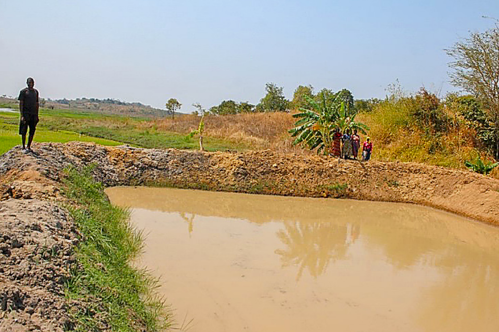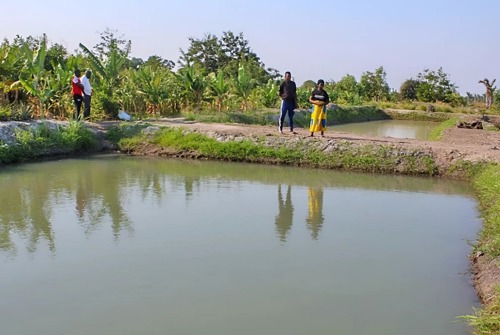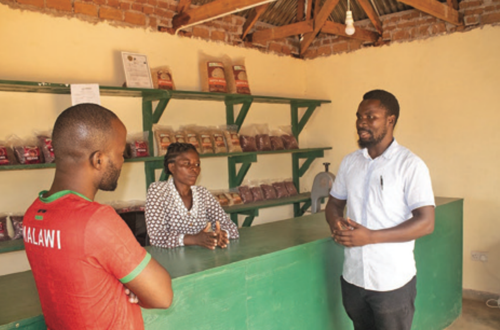Building robust and inclusive supply chains in partnership with smallholder farmers in Malawi

Photo from CASA publication: Irrigation fields of farmers under Chipelaka Cooperative
Photo from CASA publication: Irrigation fields of farmers under Chipelaka Cooperative
How can smallholder farmers in Malawi grow their farms into successful businesses? With support from the UK-funded programme Commercial Agriculture for Smallholders and Agribusiness (CASA), which NIRAS is helping to implement, agribusiness startups are helping create inclusive supply chains in aquaculture and poultry, linking farmers to training, resources, markets and more.
In Malawi, smallholder farmers have the potential to contribute significantly to food security. But in the face of challenges in scaling their operations to become commercially viable, reaching this potential can be difficult. Such challenges range from lack of training to a lack of resources to maintain their operations in a sustainable manner. More critically, smallholder farmers often lack the market networks needed to sell their produce at adequate profit, resulting in low returns for their extensive efforts.
Two startup agribusinesses from different parts of the country stepped up to combat these challenges. With the support of CASA, they set out to develop robust, inclusive and thriving supply chains in the sectors of poultry and aquaculture, a five-year programme that NIRAS is helping to implement. Over time, CASA has shown why investing in agribusinesses that work with smallholder farmers has a wealth of commercial advantages – and these agribusinesses illustrate just that.
Both enterprises created inclusive and sustainable models for doing business in collaboration with smallholder partners, helping them realise their untapped potential and leading to mutual success.
When Mervis Maseya of Tandwe Village decided to go into fish farming in 2022, she didn’t know how much it would take to become a successful smallholder fish farmer. But she was optimistic. With her children’s help, she dug a 150-square metre pond in the earth. Fishermen captured fish from the nearby rivers for her to use as fingerlings. She even produced homemade feed out of maize bran and food residue. In a year, she made her first harvest – only 20 kg – which she was able to sell at the market for 22,000 Malawi Kwacha (approximately €11).
It was only later that Mervis learned what contributed to the lackluster yields. Since she did not have proper fingerlings, this meant there was no proper control over the fish sex and reproduction, which could lead to overcrowding and stunted fish growth. The use of homemade feed was also not ideal, as the fish were unable to get the right nutrients to become large and healthy.

Mervis’s experience highlighted the challenges faced by many fish farmers in the village (and in the Nkhotakota District more broadly) in attempting to achieve greater yields of high-quality fish through their own efforts. The Jakwatu Club and Takondwa Club are business cooperatives that have also ventured into fish farming, but with ponds twice the size of the one made by Mervis and her children. Club members contributed funds for the purchase of fingerlings; however, neither club had resources for the recommended fish feed, so – like Mervis – they had to prepare homemade solutions. Jakwatu Club’s first harvest amounted to a mere 10 kg in 2023, while Takondwa Club managed 17 kg the year before that. Takondwa Club found more success in 2023, harvesting 75 kg of fish from the same pond, which suggests there is still much untapped potential for fish production.
This situation serves as a microcosm of the challenges that private agribusiness Nkhotakota Steadfast Cooperation for Youth (NS4Y) finds itself operating against. NS4Y is a partnership among four young, business-minded individuals, established in 2021 with a primary focus on fish processing (and rice trading as a secondary line of business).
The business has been experiencing major supply shortages compared to their share of demand for fish in Malawi, which they estimate at about 46 tonnes annually. NS4Y is able to supply only eight tonnes (or 17%) of that share. It contracted over 72 fishers from five communities along the shores of Lake Malawi to supply the company with that number, but the overwhelming deficit shows a definite need for the business to expand its operations.
NIRAS leads CASA’s market systems development component, implementing it jointly with Swisscontact. In this component, the team supported agricultural small- and medium-sized enterprises (SMEs) – in Ethiopia, Malawi, Nepal, Rwanda and formerly Uganda – with the knowledge and tools to grow their business through investments, linkages to commercial markets and climate-resilient agri-solutions. NIRAS also implemented the research, learning and communications component designed to identify learning gaps, identify opportunities and enable networking and communication among agribusinesses, smallholders, investors, governments and donors.
NS4Y’s incapacity in providing sufficient fish supplies resulted from the company’s dependence on capture fisheries from Lake Malawi. This has proven to be a limiting factor as the effects of climate change have affected fish populations in the lake. Meanwhile, rapid population growth increased the demand for fish products, and with local producers being unable to supply matching quantities, Malawi’s markets are flooded with fish from neighbouring countries, as well as cheap fish imported (dumped) from China. In order to achieve its growth ambitions, NS4Y decided to pivot towards developing aquaculture in collaboration with smallholder fish farmers.
The enterprise is currently transitioning from its previous business model to a more complex one involving the establishment of an outgrowing and input credit scheme to support its smallholder partners. However, aquaculture in the country is still largely in its early stages of development, and most smallholder fish farmers do not have the expertise or resources to grow high-quality fish commercially.
Many also sell their fish for low prices at their local markets, undermining profitability and, alongside the other factors, making it less viable for them to maintain aquaculture operations. In Nkhotakota District alone, less than half of the estimated 400 fishponds built are reported to be operational.

These challenges prompted NS4Y to seek support from CASA. Through technical expertise and market-based solutions to bring more effective fish farming techniques to its smallholder partners and ensure a more secure and sustainable supply chain for the business. CASA is also supporting NS4Y in piloting an input credit model with 100 smallholder partners, providing inputs such as feed and fingerlings with flexible repayment terms.
NS4Y’s business model promotes a sustainable relationship between the company and its smallholder partners. Not only does it provide them with capacity building and knowledge transfer, it also guarantees their profitability. NS4Y buys the fish in bulk at a competitive price for the smallholder partners, as compared to when they sell to vendors in smaller quantities and low prices. This is meant to ensure low-income partners are still able to access the right fingerlings as well as recommended feed, which will help to improve the health and quality of the fish they are able to sell at a higher price. This creates a sustainable supply loop that benefits both the company and its smallholder partners.
Among these smallholder partners is Mervis, who recently benefitted from NS4Y’s business model. She has since learned how to sustainably manage an aquaculture operation, upgrading her homemade strategy to one that is more commercially viable. She even felt confident enough to expand operations with a second pond.
“The model allows us farmers to access high quality fingerlings and feed. We will be able to feed our fish starter, grower and finisher as per recommendations thereby improving the quality and productivity of the fish,” she says.
Mervis confirms that NS4Y’s model is providing an attractive market for smallholder fish farmers to resume their operations. For her part, she is even more optimistic now that she will be able to generate enough profit from her operations to construct more ponds according to recommended specifications and to put some of the money towards other business investments.
Elsewhere in Malawi, CASA has also made inroads towards developing more inclusive and sustainable supply chains in sectors other than aquaculture. One such sector is poultry, which has experienced significant growth in investment. Large companies have dominated the production of hybrid chickens (selectively bred for faster growth or greater egg production) and their economies of scale present competition for the more resource-constrained smallholder poultry farmers, who are at risk of being pushed out of the business entirely.
This is the situation that Small Producers Development and Transporters Association (SPRODETA) found itself in when starting its operations. Mzuzu City-based SPRODETA Agribusiness was established in 2020 as a commercial offshoot of SPRODETA NGO. The activities of these two arms are completely separate, but they do cooperate to leverage their synergies whenever possible.
SPRODETA Agribusiness realised there was a relatively untapped market for indigenous chickens that had largely gone under the radar of large poultry companies. Indigenous chickens are known to adapt easily to local conditions, thrive in low input systems and retain mothering instincts more reliably than commercial chicken breeds. They can also often serve dual purposes, raised both for eggs and meat. Because of the lack of competition as well as the relative ease of raising indigenous chickens, smallholder poultry businesses were well-placed to capitalise on this market opportunity.
Similar to NS4Y, SPRODETA’S goal is to build a secure and sustainable supply chain for indigenous chickens in collaboration with smallholder partners. It has organised partners from two cooperatives, Kayolo and Chipeleka, and are helping them improve their capacities to produce indigenous chickens commercially, supplying the company through an out-grower scheme it has developed with support from CASA. So far, SPRODETA has mobilised close to 1,500 smallholder poultry farmers, a large majority of them women and youth.
Some key outcomes:
SPRODETA has begun providing its supplier smallholders with training on good livestock management practices as well as entrepreneurship and business management skills. With support from CASA, these training sessions will continue, and the smallholders will gain access to extension support from SPRODETA to further enhance their capacities in the commercial production of indigenous chickens.
These smallholders were also given vocational skills training and encouraged to expand their operations into related agricultural activities, such as irrigation farming. Under this scheme, the farmers grow maize, soybeans and vegetables and use chicken droppings as manure for their fields. The proceeds from this farming would then be contributed to the cooperatives for procuring chicks, buying chicken feed and accessing veterinary services.
CASA is also helping SPRODETA build business capacities to attract commercial investments that would help it expand operations. SPRODETA intends to use the funding to build essential infrastructure such as a feed mill, incubation and hatchery facilities, processing equipment for dressed chickens, and refrigerated vehicles and freezers to store processed poultry products. CASA estimates the company would require around €70,000 to expand production from the current 1,200 chickens to 30,000 chickens per year.

Because of its activities, farmers in the wider Mzimba District now consider SPRODETA an established brand and have developed enough confidence in the company to cooperate with them as partners. The direct impact on farmers’ lives encouraged others to participate more actively in business operations. SPRODETA has welcomed this increased initiative on the part of their smallholder partners and encourages their involvement.
We are glad as in the current initiative, the farmers are engaged in decision-making right from the choice of the breed, the arrangements in the out-grower scheme, and the production and marketing mechanisms.
Chairperson Eves Kumwenda of the Lumemo cluster
From Mervis’s success in expanding her fish farming operation to SPRODETA’s indigenous chicken out-growing scheme, the stories emerging from the CASA-supported projects in Malawi illustrate the power of inclusive supply chain development.
Equipping smallholder farmers with the right tools and networks helps them unlock their full potential as partners in sustainable growth, transforming subsistence livelihoods into profitable, resilient businesses.
As Malawi’s smallholder farmers continue to face challenges of food security, climate change and competition from large enterprises, the business models offered by companies like NS4Y and SPRODETA offer a promising blueprint for rural empowerment and long-term impact that benefits both the company and its smallholder partners.



